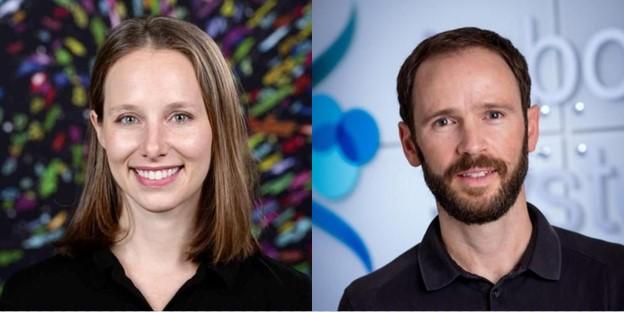
Drs. Alicia Darnell and Christopher Chidley have been appointed as tenure-track Assistant Professors in the Department of Pharmacology and Cancer Biology. They will open their labs in September 2024 and are recruiting graduate students, research technicians, and postdocs.
Dr. Alicia Darnell
Dr. Darnell is currently a Charles A. King postdoctoral fellow in Matthew Vander Heiden’s lab at the Koch Institute for Integrative Cancer Research at MIT. She studies how amino acid limitation directly controls protein synthesis in the cell by causing ribosome stalling and premature fall-off, a basic question of particular importance in nutrient-limited cancer cells. Her lab will utilize a library of fluorescent reporters for premature ribosome fall-off, as well as mass spectrometry and sequencing-based tools, to study this interaction between metabolism and protein synthesis. This work will inform therapeutic tactics that take advantage of the unique susceptibility of cancer cells to amino acid limitation and translation stress.
Dr. Darnell became interested in this question as a graduate student at Harvard University with Dr. Erin O’Shea, working closely with mentor Dr. Arvind Subramaniam to apply the then-new ribosome profiling method to monitor translation at specific codons during amino acid limitation. Transitioning to Dr. Vander Heiden’s lab for a postdoc, she explored the metabolic underpinnings of her findings and their importance in cancer cells, while developing tools and ideas to bridge her expertise in translation and metabolism in her own group.
Dr. Christopher Chidley
Dr. Chidley is an independent research fellow in the Laboratory of Systems Pharmacology at Harvard Medical School. He investigates the role of transporter proteins in nutrient and metabolite import/export and their impact on cell state and response to chemotherapeutics. His lab will use unbiased genetic screening in cell and animal models along with biochemistry, cell biology, and analytical chemistry tools to identify critical small molecule transporters across different environments, characterize their function, and explore how the tumor microenvironment impacts cancer metabolism. His research aims to guide the development of metabolic strategies to suppress tumor growth, and aid precision medicine efforts by revealing determinants of drug sensitivity.
Originally from the mountains of Switzerland, Dr. Chidley obtained his Ph.D. at the École Polytechnique Fédérale de Lausanne (EPFL) in the lab of Dr. Kai Johnsson. Throughout his career, he has developed genetic screening platforms to uncover how small molecules or metabolites affect disease-relevant cellular biology. In his Ph.D., he developed a yeast-based screen to characterize the mechanism of action of poorly understood, widely used drugs like sulfasalazine. He then joined Dr. Erin O’Shea’s laboratory at Harvard University as a postdoctoral fellow, where he used haploid genetic screens to uncover how a potent natural product kills cancer cells. As an independent fellow at Harvard Medical School working with Dr. Peter Sorger, he developed the foundation for his independent lab, a CRISPR screening platform to systematically interrogate the contribution of nutrient transporters to cancer cell proliferation.
In an email to the department, Dr. Lee Zou, Chair of the Department of Pharmacology and Cancer Biology, wrote, “We are excited to welcome Dr. Darnell and Dr. Chidley to our faculty. Their innovative research and commitment to excellence will undoubtedly enrich our academic community and contribute significantly to our research and teaching missions.”
Drs. Chidley and Darnell are thrilled to be moving to the Durham area to do exciting science, go running amidst the pines, and become basketball fans.